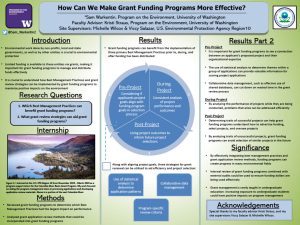How Can We Make Grant Funding Programs More Efficient
Grants for environmental projects are an important source of funding for many non-profit and government entities. With grant funds, organizations can conduct projects that advance environmental goals locally, regionally, and even nationally. Grant funding programs, programs that distribute grant money to chosen organizations, can play a large role in environmental protection due to their ability to enable a variety of environmental projects. Yet, seldom do the dynamics of grant funding programs get analyzed in-depth. Due to this, it is important to understand which Best Management Practices (BMPs) could have the most impact on grant funding program performance. The purpose of this study was to analyze which BMPs could be utilized by grant funding programs to increase program performance. To do this, I conducted a literary analysis of grant management literature as well as by analyzing BMPs through the use of sample application data. My research was also aided by my internship at the U.S. Environmental Protection Agency Region 10 as a program support intern for the Columbia River Basin Grant Program. The results of my research indicate that grant funding programs can benefit from ensuring that selected projects align with organizational goals. Grant funding programs can also benefit by conducting analyses of project performance and by using application information and project outcomes to inform future project selections. By effectively integrating BMPs, grant funding programs can meet their organizational and environmental goals more effectively.
